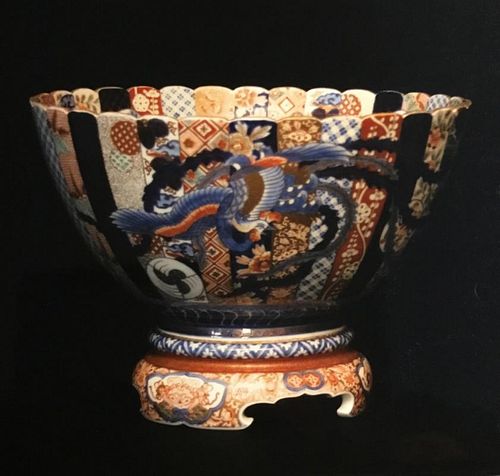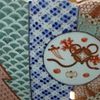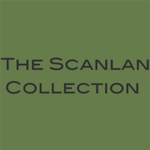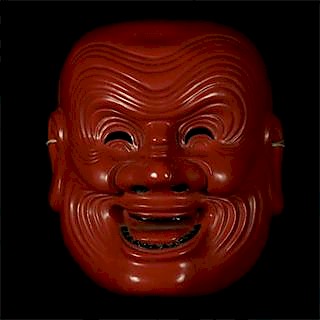Fukugawa Punch Bowl on Stand, Japan, C. 1890
About Auction
Nov 17, 2017 - Dec 4, 2017
The Scanlan Collection Michael@thescanlancollection.com
- Lot Description
Imari is the name applied to most of the Japanese porcelains shipped from the port of Arita, Japan, from the 17th century onward. The three colored ware, featuring underglaze blue decorations with thick rusty-red enamels and gilding was greatly admired by the European and American markets. By the end of the 17th century, China was exporting large quantities of porcelain to Europe, but with the discovery of kaolin (white clay used in porcelain) in 1613 near Arita, the Japanese porcelain production in the Chinese style was soon created. In 1644, the Ming Dynasty ended when the Qing Dynasty began. As a result of the ensuiung turmoil, Chinese exports fell just as the Japanese production increased and for the next century or so, massive quantities of Japanese wares were shipped to Europe.By the end of the 18th century, China again begin shipping porcelain to Europe at much lower prices than the Japanese could offer, so the Japanese export market collapsed. Sound familiar?After Commodore Perry’s visit to Japan in 1853 (where trade pacts were forcefully demanded and received from the Japanese), the international intrigue with Japanese art and exports grew rapidly and demand was met with mostly poor quality porcelains.In an effort to restore Japanese ceramics to their higher form of earlier years,Ezaiemon Fukugawa, the head of the Fukugawa family that had been producing ceramics since the 17th century, opened the Koransha (Scented Orphid) factory in 1875. In 1894, his second son, Churi Fukugawa opened the Fukugawa Porcelain Factory. His first prize at the Paris International Exposition in 1900 was instrumental in establishing his company as the leading mass producer of high quality Japanese porcelain in the Imari style.This massive 32-lobed Fukugawa Punch Bowl on a stand in typical Imari colors features an elaborate Hou-ou bird on both the interior and exterior of the bowl. The scalloped rim separates repeating geometric designs and floral patterns every eight panels. The panels are broken up with scattered roundels of landscapes, florals, and mon (family crests), resting on a custom three footed stand with three cartouche of ShiShi (temple lion dogs) against a red ground of detailed vines and flowers. This punchbowl matches a pattern dated 1893 by Chuji Fukugawa and the markings are consistent with the period 1895 – 1900. 14.75 x 10.5 inches
- Shipping Info
-
PACKING AND SHIPPING
Once full payment for the purchased item has been received, TSC will notify buyer of the approximate packing/crating and domestic shipping charges for all lots, typically within three business days of sale. Once approved by Buyer, the item(s) will be professionally packed/crated. Once packing and shipping costs are established, Buyer shall pay all charges prior to their release. TSC will make arrangements to tender small shipments to an approved carrier, typically The UPS Store. Larger items requiring crating will be crated and prepared for transport and held for pick up at the location of the crating company by an approved carrier choice of the buyer. Once tendered for transportation to either The UPS Store or the buyer’s designated carrier, TSC shall have no liability whatsoever for any damages or losses resulting from the transportation of any said item(s) and all responsibilities are between The UPS Store and the buyer or the approved carrier and the buyer.
Once packing/crating charges have been paid for all International shipments, the items will be held at the packing/crating facility and are the full responsibility of the buyer to arrange transportation. In addition, all costs and charges associated with import/export customs, duties, and taxes for said items are the complete responsibility of the Buyer. An invoice stating the actual purchase price will accompany all international purchases. For additional information or pre-auction estimates, contact us via email at michael@thescanlancollection or via phone at 510.755.3858.
IMPORT/EXPORT RESTRICTIONS.
Certain properties sold at auction may be subject to laws governing export from the United States, including material from endangered species. In addition, certain countries may have additional Import restrictions from foreign countries. Granting of licensing for import or export of Property from local authorities is the sole responsibility of the Buyer. Denial or delay of licensing will not constitute cancellation or delay in payment for the total purchase price of said Property.
-
- Buyer's Premium



 EUR
EUR CAD
CAD AUD
AUD GBP
GBP MXN
MXN HKD
HKD CNY
CNY MYR
MYR SEK
SEK SGD
SGD CHF
CHF THB
THB













